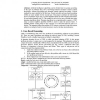46 search results - page 7 / 10 » The Learning Power of Belief Revision |
KES
2004
Springer
14 years 25 days ago
2004
Springer
Artificial Intelligence algorithms can be divided into two groups according to the type of problems they solve. Knowledge-intensive domains contain explicit knowledge, whereas know...
CORR
2012
Springer
12 years 3 months ago
2012
Springer
We address the problem of learning the parameters in graphical models when inference is intractable. A common strategy in this case is to replace the partition function with its B...
COLT
2005
Springer
14 years 1 months ago
2005
Springer
We consider a natural framework of learning from correlated data, in which successive examples used for learning are generated according to a random walk over the space of possibl...
ENTCS
2006
13 years 7 months ago
2006
Conventional approaches to the modeling of autonomous agents and agent communication rely heavily on the ascription of mental properties like beliefs and intentions to the individ...
KESAMSTA
2009
Springer
14 years 1 days ago
2009
Springer
ent Artificial Immune Systems (MAAIS) for Intrusion Detection: Abstraction from Danger Theory Chung-Ming Ou, C.R. Ou Ants-like Agents: a Model and Analysis Based on Natural Ants Be...

